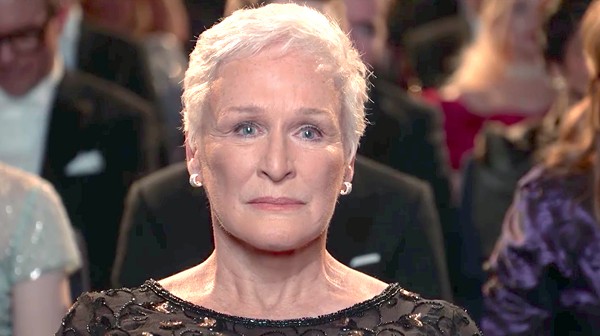Six-time Academy Award-nominated actress Glenn Close (Albert Nobbs) has portrayed many powerful women in her career — from the commander of an intergalactic military in Guardians of the Galaxy to a puppy-hating villainess in 101 Dalmatians to the vice president of the United States in Air Force One. Close, however, has never possessed as much control — although veiled — over another character as she does in The Wife, a thought-provoking yet sometimes all-too-theatrical drama that features her in one of her best performances ever.
Set in 1992, The Wife stars Close as Joan Castleman, the loving and supportive title character who curtails her emotions when news breaks that her writer husband Joseph (Jonathan Pryce) will be presented with the Nobel Prize in Literature. Both she and Joe are grateful, but there is a secret Joan has been harboring for decades that could affect their trip to Stockholm to accept the award.
This twist in the story, which comes around the halfway point of the film, is an obvious one if audiences are paying close attention. Swedish director Björn Runge (Happy End) and screenwriter Jane Anderson (How to Make an American Quilt) don’t seem too concerned with concealing it or making the big reveal hit particularly hard. Instead, what makes The Wife noteworthy is how Close depicts her own limits of restraint between the first and second halves of the film as the couple attend events leading up to the prestigious ceremony.
As well regarded as Joseph is as a writer in his professional life, getting a glimpse of him as a husband exposes everything audiences need to know about his character. He’s unfaithful and almost childlike. Without Joan, he’d forget to put on his pants before walking out the door. The dynamic shifts incredibly well as Runge and Anderson balance the present-day narrative with flashbacks to the 1960s of Joan and Joseph’s relationship in its early stages. During this time, Joseph was a married writing professor and Joan was his smitten student.
When Close and Pryce share the screen, it’s impossible to look away, even when things get a bit melodramatic. It’s much easier to lose interest in the secondary storylines, which aren’t fleshed out nearly enough to make much of an impact. These include scenes with an insistent biographer (Christian Slater) jockeying for a position with Joseph and the Castleman’s adult son (Max Irons), a writer who broods like a 14-year-old boy and craves his father’s approval.
Nevertheless, Close is nearly perfect as a long-suffering wife who decides she’d rather not take on that role any longer. Witnessing that realization and seeing the pain, resentment and humiliation that comes with it — and then to watch Close repress those feelings — is something special to behold.


